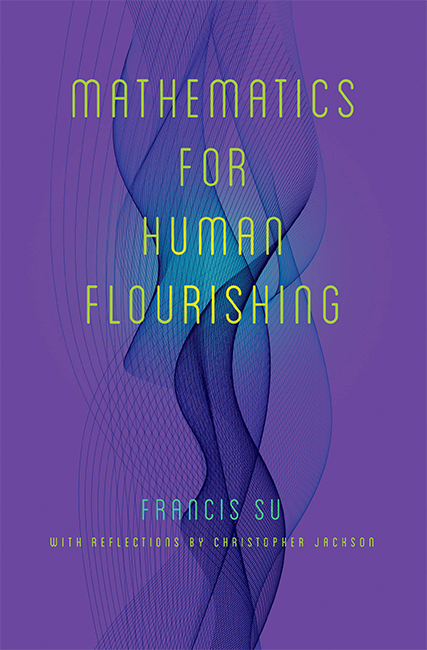Su Publishes Math Book for Wide Audience
December 2, 2019
Francis Su wants you to live life more fully, and one key, he says, is more math.
“The practice of mathematics cultivates virtues that help people flourish,” says Su, Benediktsson-Karwa Professor of Mathematics. “These virtues serve you well no matter what profession you choose. And the movement towards virtue happens through basic human desires.”
This is the premise of Su’s new book, Mathematics for Human Flourishing (January, 2020), in which Su describes how mathematics meets basic human desires—such as play, beauty, freedom, justice and love—and cultivates virtues essential for human flourishing.
“The book is a broad explanation for the general public about what math is, who it’s for, and why anyone should learn it,” Su says. “There are better answers to the question ‘why do math?’ than ‘because you’ll need it later.’ We don’t tell people to learn basketball by having them shoot free throws over and over and then say, ‘you’ll play the game later.’ So I make the argument that people are able to enjoy math when they see how it connects to their basic human desires. I discuss a dozen human desires in the book that math can, or should, meet.”
Su gives the desire for play as an example. “All humans have the desire for play, and yet, often, math is not taught as a playful enterprise, but rather as a one-way transmission and memorization of information,” he says. “Seeing math as play would transform the way we think about math. We would more interested in exploring the patterns we see in the world. It leads to many virtues, including curiosity—when you can’t wait to discover something new—and perseverance—because when you’ve experienced the joy of play, you want to play more.”
Su believes that the connection between mathematics and basic human desires makes the pursuit of math similar to the pursuit of passions such as art or music or sport. “We pursue sport because of our desire for play and our desire to grow skilled in physical ways. Doing math properly is exactly like that. We pursue art or music because of our desire for beauty that nourishes our spirit. Appreciating beauty in math is very similar. So as I realized these things, I began to ask: What are the basic human desires that draw us to any passion that we have, and does math meet those desires in some way?”
Su’s inspiration for the book was the speech he gave in January 2017 as retiring president of the Mathematical Association of America. “That speech was trying to help math professors specifically think about the deeper desires that motivate all of us to do math and how we can make that connection for our students, who often just see the practical answers but don’t find them very satisfying,” Su says of the speech. “However, when Yale Press approached me about doing a book for the public, I began thinking about how I could make the general argument to the public, answering that same question ‘why do math?’”
Mathematics for Human Flourishing comes on the heels of another book, Topology Through Inquiry (AMA/MAA Press, 2019), which Su coauthored with Michael Starbird, one of Su’s professors during his undergraduate studies at the University of Texas at Austin. A comprehensive introduction to point-set, algebraic and geometric topology, the text is designed to support inquiry-based learning courses for upper-division undergraduate or beginning graduate students.
“I’ve been using the notes that formed this book for many years in Math 147 (Topology), so many Harvey Mudd students have influenced the direction of this book and appear in the credits,” Su says. “Learning topology from Starbird in the inquiry-based format convinced me that I could be a mathematician. The inquiry-based learning method guides students to make discoveries for themselves.”
Su presented the 17th lecture in The Michael E. Moody Lecture Series on Mathematics for Human Flourishing Dec. 4. Mathematics for Human Flourishing will be published by Yale University Press on Jan. 7, 2020.
